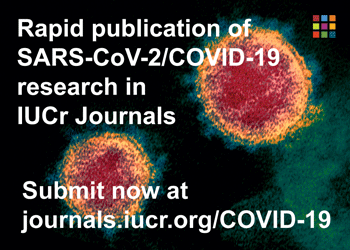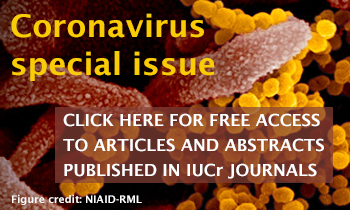issue contents
March 2020 issue

editorial
CHEMISTRY | CRYSTENG
The articles in crystal engineering and structural chemistry in IUCrJ published from 2019 onwards reflect the breadth and outreach of this new and important subject.
scientific commentaries
BIOLOGY | MEDICINE
The enzyme carbonic anhydrase binds its zinc ion by three histidine residues in a similar manner to the way copper is bound to nitrite reductase. This remote similarity has now been shown to be real [Andring et al. (2020). IUCrJ, 7, 287–293]. A carbonic anhydrase with two bound copper ions is also a nitrite reductase.
CHEMISTRY | CRYSTENG
Han et al. [(2020), IUCrJ, 7, 228–237] using advanced electron microscopy and crystallographic modelling rationalise the microstructure of twinning defects in order to visualize mesophase transitions and surface properties of G and D bicontinuous cubic mesostructured silica. This work furthers our understanding of how these phases originate in many natural and synthetic systems.
feature articles
BIOLOGY | MEDICINE
A description is given of the first protein crystals to be successfully cryo-cooled with cryo-protectants; the crystals were then exposed to intense X-rays with reduced damage. A history-of-science description is provided of cryo-procedures that are universally used today with synchrotron radiation for macromolecular crystallography.
research letters
MATERIALS | COMPUTATION
A method to fragment quantum-chemical calculations in Hirshfeld-atom refinement is reported, which allows accurate aspherical atom X-ray refinement of polypeptides and proteins.
NEUTRON | SYNCHROTRON
This study reports a solution structural investigation of the Cqm1–BinB protein complex using `contrast-matched' small-angle neutron scattering (SANS). The SANS data clearly reveal that BinB binds to the receptor Cqm1 and alters its oligomeric status from a dimer to a monomer.
research papers
CHEMISTRY | CRYSTENG
Download citation


Download citation


Many single- and multicomponent forms of two structurally related pharmaceutical drugs, tolfenamic acid and mefenamic acid, are isostructural in nature. This observation prompted the search for hidden forms by mapping the structural landscapes of the two drugs.
CHEMISTRY | CRYSTENG
Successive transitions toward unconventional charge density wave states are shown by resistivity measurements and thermal X-ray diffraction.
BIOLOGY | MEDICINE
Contrary to the general concept, the archaeal Smc-based complex appears to lack the kite subunit ScpB that is essential in the bacterial Smc–ScpAB complex that mediates chromosome organization.
BIOLOGY | MEDICINE
A 3D-printed, X-ray-compatible microfluidic device (3D-MiXD) has been developed and used to rapidly collect highly redundant diffraction data sets from protein microcrystals in flow using a monochromatic serial synchrotron crystallography approach.
CRYO | EM
Optimized protocols for protein production and purification as well as cryoEM grid preparation allow the reconstruction of a 3D map of yeast fatty acid synthase (FAS) at ∼3 Å resolution from a comparatively small number of particle images within a short time. The first complete model of yeast FAS is presented.
EMDB reference: yeast FAS, EMD-10420
PDB reference: yeast FAS, 6ta1
CHEMISTRY | CRYSTENG
State-of-the-art electron crystallography when combined with geometric techniques to model curved surfaces enables an in-depth study of twinning defects in bicontinuous cubic structures.
BIOLOGY | MEDICINE
Download citation


Download citation


Analysis of crystallographic, solution scattering and biochemical experiments suggests a mechanism for the sequestration of transforming growth factor β-1 by latency-associated peptide (LAP) that includes a structural change in LAP from an open to a closed conformation. This mechanism contains several potential regulatory features that are exploitable for therapeutic development.
PDB reference: latency-associated peptide, 6p7j
SASBDB reference: wild-type human latent transforming growth factor β-1 (LTGFB-1), SASDFD2
CRYO | EM
Methods are presented that estimate symmetrical and antisymmetrical optical aberrations, as well as magnification anisotropy, in a cryo-EM data set. Considering these effects improves the resolution of the 3D reconstruction when these effects are present.
MATERIALS | COMPUTATION
Mesoporous titania thin films backfilled with the conjugated polymer PTB7-Th or the small-molecule PhenTe-BPinPh have been studied as novel materials for hybrid photovoltaics. Together with observed structural changes due to backfilling, volumetric mass density can be excluded in determining factors that influence backfilling efficiency for solar cell applications.
PHYSICS | FELS
A novel analysis method is proposed for X-ray diffraction patterns recorded in single-shot wide-angle X-ray scattering experiments of free-flying single nanoparticles. The crystalline defects in the nanoparticles are characterized by analyzing the angular correlations between Bragg spots in the single diffraction patterns.
BIOLOGY | MEDICINE
This work utilizes X-ray crystallography to provide mechanistic insights into how carbonic anhydrase II can act as a nitrite reductase in the presence of copper.
BIOLOGY | MEDICINE
A new approach of rationally designing an N449R mutation was developed to lock human muscarinic receptor M4 into an inactive form, and the crystal structure of the inactive M4 in a ligand-free form was determined.
PDB reference: muscarinic receptor M4, 6kp6
BIOLOGY | MEDICINE
Serial X-ray crystallography and microcrystal electron diffraction were performed using microcrystals of the enzyme cyclophilin A. The results highlight the strengths and weakness of the two complementary methods.
CHEMISTRY | CRYSTENG
Download citation


Download citation


A sixfold interpenetrated metal–organic framework (MOF) with dia topology isolated in the first attempt could not be reproduced; subsequent synthesis yielded only the double-pillared-layer MOF. However, this `disappeared supramolecular isomer' reappears in the presence of a perylene guest.
CHEMISTRY | CRYSTENG
A comparative study of 34 single-crystal-to-single-crystal phase transitions in aliphatic linear-chain amino acid crystals is applied to obtain insight into their transition mechanism.
BIOLOGY | MEDICINE
Combining data-analysis statistics from crystallographic software with machine learning can predict the chances of experimental phasing success.
BIOLOGY | MEDICINE
Structural analysis of the apo form of the human MICU1–MICU2 heterodimer suggests how the heterodimer sets a higher Ca2+ threshold than the MICU1 homodimer. This provides a framework for understanding the gatekeeping role of the MICU1–MICU2 heterodimer.



 journal menu
journal menu




 access
access




































